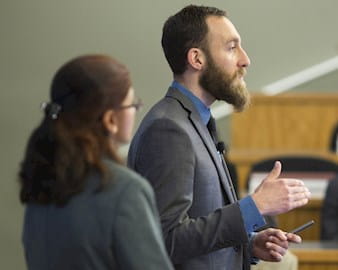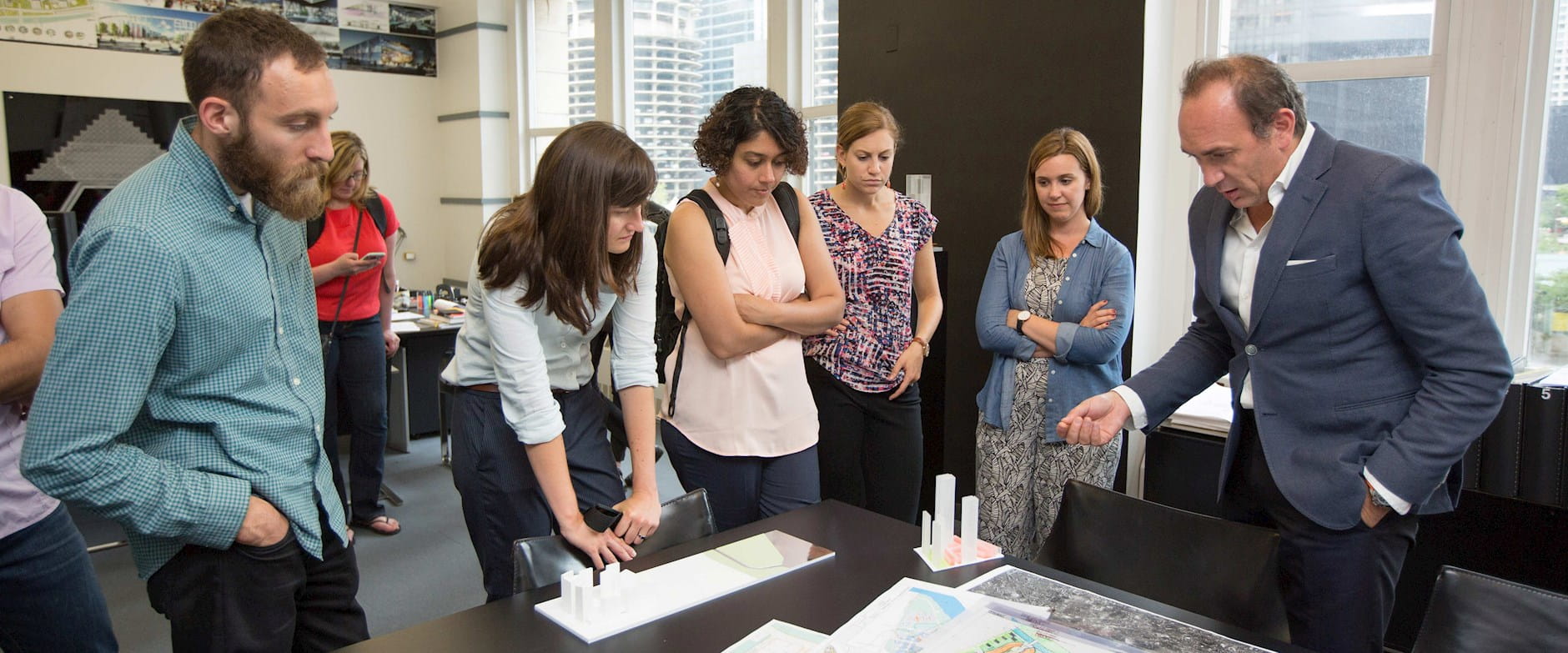It didn’t take Kyle Johnson, ’19, long to work his way up the career ladder at one of his first jobs after college. He enjoyed working at Accion Chicago, knowing he was helping the nonprofit provide microloans to small business owners in need.
After being promoted twice in a few short years, Johnson remembers sitting in his annual review with his supervisor, who was the first to suggest Johnson think about going to business school.
“I was starting to kick around the idea of going back to school, but an MBA was something that was not at all on my radar,” said Johnson, a Minnesota native and arts major. Business school was about making profits over everything else, right?
His boss handed him a flyer for the Civic Scholars Program at the University of Chicago Booth School of Business, which offers substantial scholarships—up to 100 percent—to nonprofit and government employees who want to pursue an MBA degree.
The scholarship was designed with Johnson in mind—an emerging leader dedicated to a career in social impact. Someone who’s mission driven and eager to take on more of a role in operations, management, and strategy to tackle challenges in the public or nonprofit sectors.
“A lot of the best candidates for Civic Scholars are people who don’t think they want an MBA,” Johnson said. “But do you want to be executive director or CEO leading a public organization? That’s what an MBA is going to prepare you for.”
When Johnson got to Chicago Booth, he was surprised to learn he wasn’t the only student interested in social impact. The professors also talked about more than just financial returns.
“I don’t think a professor ever espoused high moral value to making a profit,” said Johnson, who graduated from the Weekend MBA Program in June. “They’d say, ‘We’re going to teach you how to run an organization. If you do that really well, your desired outcomes will follow.’”
This year, Booth expanded the Civic Scholars Program to offer both full-and partial-tuition scholarships to impact-driven students in its Full-Time, Evening, and Weekend MBA Programs.
With the expansion comes a deeper partnership with Chicago Booth’s Rustandy Center for Social Sector Innovation, now in its eighth year as the business school’s destination for people committed to helping solve complex social and environmental problems.
“The Civic Scholars Program is the most comprehensive effort by any world-class business school to arm nonprofit and government employees with critical leadership skills that can both advance their careers and the good work and thinking the social sector brings to bear on some of the world’s most intractable problems,” said Robert Gertner, the Joel F. Gemunder Professor of Strategy and Finance at Chicago Booth, John Edwardson Faculty Director of the Rustandy Center, and one of two new faculty codirectors of the Civic Scholars Program.
Learning to lead
Strapped for time and energy to innovate in the daily grind of a small nonprofit, Johnson used to attend daylong leadership seminars for professional development. These workshops provided a glimpse of what a deeper dive into operational management could provide.
What he learned in his MBA classes he could put straight to work at the nonprofit.
“We are a growing organization, and we need to grow our sophistication,” Johnson said. “There are best practices out there, and you can learn them. People often talk about ‘how to translate’ business skills into work in the nonprofit sector, but there is almost no translation required. It’s the type of work we’re already doing—trying to effectively run resource-constrained organizations to create the most impact.”
Launched in 2016 with seed funding from the Neubauer Family Foundation, students—known as Neubauer Civic Scholars—are taught by the same world-renowned faculty and earn the same MBA degree. They also receive specialized programming, dedicated faculty, and networking opportunities.
“The Booth approach to developing outstanding managers is to immerse our students with the disciplines that are essential for management – economics, psychology, statistics and quantitative methods, etc.,” said George Wu, the John P. and Lillian A. Gould Professor of Behavioral Science and codirector of the Civic Scholars Program. “Nonprofit or government sector leaders must also understand the institutions and the problems and possible solutions facing their sector. The clear thinking a Booth MBA provides allows leaders to develop, choose, and implement new solutions for their sector’s most challenging social problems.”
To date, six Neubauer Civic Scholars have graduated from the program, and 21 Scholars are currently enrolled as MBA candidates. Part of the scholarship is a commitment to continue working in the social sector after graduation.
The program expansion is being funded through additional support from the Neubauer Family Foundation, which has invested a total of $7 million to date in the Civic Scholars Program.
Navigating a career in social impact
Helping to uplift communities by supporting entrepreneurs has been Johnson’s life’s work. While at Booth, he worked to cofound Business Services Collective, which provides shared back office resources to small, diverse construction companies.

Since then, he’s taken advantage of many of the university’s social impact resources. He took the startup idea through the John Edwardson, ’72, Social New Venture Challenge (SNVC), a socially focused venture startup competition that's run by the Rustandy Center and the Polsky Center for Entrepreneurship and Innovation. Business Services Collective took home second place and $30,000 in the SNVC Finals and went on to earn spots in the Polsky Accelerator and Polsky Incubator. As one of the Rustandy Center’s Tarrson Social Venture Fellowship winners, he is now able to work on Business Services Collective full time.
He said he’s been impressed by Booth’s ever-growing list of social impact lab courses, student groups, and the Rustandy Center’s work to help students leverage their MBAs for social good.
“A lot of the best candidates for Civic Scholars are people who don’t think they want an MBA,” Johnson said. “But do you want to be executive director or CEO leading a public organization? That’s what an MBA is going to prepare you for. How do you lead teams of people? How do you manage a budget? How do you allocate and best engage limited resources? If you are serious about leading an organization to generate significant social impact, an MBA is definitely going to provide you the tools, confidence, and networks to implement change.”
Interested in the Civic Scholars Program or know someone who might be a good fit? Check out the Civic Scholars website, nominate individuals through this online form, or contact Prentiss Koldyke at Prentiss.koldyke@chicagobooth.edu. You can also share this pdf.
Note: The deadline to participate in the 2020-21 cycle is January 7 for full time and February 17 for part time.


